- Resume Builder
- Resume Templates
- Resume Formats
- Resume Examples
- Cover Letter Builder
- Cover Letter Templates
- Cover Letter Formats
- Cover Letter Examples
- Career Advice
- Interview Questions
- Resume Skills
- Resume Objectives
- Job Description
- Job Responsibilities
- FAQ’s

Geriatric Nurse Cover Letter Example
Writing a cover letter for a geriatric nursing role is a great opportunity to showcase your professional experience, strengths, and qualifications. Your cover letter should provide a brief but effective snapshot of your suitability for the role, and motivate the reader to learn more about you and your skills. To help you create an impressive cover letter, this guide will provide tips and advice on what to include, and a sample geriatric nurse cover letter.
If you didn’t find what you were looking for, be sure to check out our complete library of cover letter examples .

Start building your dream career today!
Create your professional cover letter in just 5 minutes with our easy-to-use cover letter builder!
Geriatric Nurse Cover Letter Sample
Dear [Hiring Manager],
I am writing to express my interest in the geriatric nurse position currently available at [Company Name]. With more than [Number] years of experience providing compassionate care to elderly patients, I am confident that I can be an asset to your healthcare team.
I am a [state license/certification], and I specialize in geriatric nursing. My background includes assessing elderly patients and providing care to manage pain or chronic illnesses, as well as developing individualized care plans and coordinating with families to ensure the best possible outcomes.
I have a proven track record of providing exceptional geriatric care. I have extensive experience with elderly patients and am passionate about helping them maintain their quality of life. I am confident in my ability to provide the best possible care to your patients.
In addition to my nursing experience, I am an excellent communicator and team player. I am comfortable working with both caretakers and physicians to ensure that all elderly patients receive the best possible care.
I am excited about the opportunity to join your team as a geriatric nurse and I am confident that I can provide valuable contributions to your facility. I have attached my resume for your review and I would welcome the opportunity to discuss my qualifications in more detail.
Thank you for your time and consideration.
Sincerely, [Your Name]
Create My Cover Letter
Build a profession cover letter in just minutes for free.
Looking to improve your resume? Our resume examples with writing guide and tips offers extensive assistance.
What should a Geriatric Nurse cover letter include?
A geriatric nurse cover letter should include information about the nurse’s experience, expertise and qualifications in caring for elderly patients. The cover letter should demonstrate the nurse’s understanding of geriatric health care and their passion for serving the elderly population. Additionally, a geriatric nurse cover letter should include why the nurse is the best candidate for the job, such as describing past successes in providing care and highlighting any special skills, such as experience working with dementia and Alzheimer’s patients, that would make the nurse an asset to the facility. Finally, the cover letter should emphasize any certifications or credentials relevant to geriatric nursing and include contact information so the employer can reach out with any questions.
Geriatric Nurse Cover Letter Writing Tips
Writing a cover letter for a geriatric nursing position can be a daunting task. To make sure you stand out from the crowd, here are some key tips for putting together an effective cover letter:
- Start your cover letter with an attention- grabbing introduction. Show your enthusiasm for the role and the organization, and mention any relevant knowledge or experience you have.
- Research the organization you’re applying to and highlight how you can contribute to their mission. Show that you understand their values and are eager to help them achieve their goals.
- Clearly communicate why you’re uniquely qualified for the job. Highlight your qualifications, achievements, and goals in this field.
- Be clear and concise with your language. Use language that is easy to read and understand.
- Describe your experience working with geriatric patients and how you can apply that knowledge to the position.
- Include stories or anecdotes that will make you stand out from other candidates.
- Demonstrate your commitment to the organization, and show that you’d be an asset to their team.
- Proofread your letter for any spelling or grammar errors. Make sure everything is error- free before you submit it.
By following these tips, you can be sure that your cover letter for a geriatric nursing position will make the best impression and will help you stand out from the competition. Good luck!
Common mistakes to avoid when writing Geriatric Nurse Cover letter
Writing a cover letter for a position as a Geriatric Nurse can be a daunting task, especially if you are unsure of what to include. To ensure that your cover letter stands out from the competition, here are some common mistakes to avoid while creating your cover letter:
- Not Tailoring Your Cover Letter: It is important to tailor your letter to the specific position you are applying for. Taking the time to research the company and position allows you to create a more personalized letter.
- Overlooking Important Details: When writing a cover letter, make sure to include all the important details about yourself, such as your qualifications, certifications, and experience. If the job posting includes specific skills or qualifications, make sure to mention them in your cover letter.
- Writing an Unprofessional Letter: It is important to write a professional cover letter that will impress your potential employer. Avoid using unprofessional language or slang, and make sure that the tone of the letter is appropriate for the position.
- Not Proofreading: Make sure to thoroughly proofread your cover letter before sending it. A few small mistakes can make a big difference in how your letter is perceived by the employer.
- Not Checking for Formatting Errors: Make sure to check for formatting errors in your cover letter. Ensure that your documents are formatted correctly and that you are using a readable font size and style.
By avoiding these common mistakes, you can ensure that your Geriatric Nurse cover letter stands out from the competition and puts you in the best position to land the job.
Key takeaways
Writing a cover letter for any job can be challenging, but it can be even more difficult when applying to be a Geriatric Nurse. It’s important to make sure your cover letter stands out and includes the key components employers are looking for. Here are some key takeaways for writing impressive Geriatric Nurse cover letters:
- Showcase your knowledge and passion for geriatric care: Describe your experience with senior citizens, including any special skills or certifications you hold. Also, make sure to include stories of how your involvement in geriatric care has made an impact on patients.
- Highlight your communication skills: As a Geriatric Nurse, you must be able to communicate with patients, their families, and other medical professionals. Make sure to include in your cover letter any relevant skills or knowledge you have in communication, such as being able to speak a foreign language or having taken a special course in communication techniques.
- Demonstrate your commitment to excellence: As a Geriatric Nurse, you must always strive to provide the best care possible. Highlight any awards, certifications, or other recognitions you received that demonstrate your commitment to excellence.
- Stress your ability to remain calm in difficult situations: As a Geriatric Nurse, you must be able to handle difficult situations with grace and remain calm in an emergency. Make sure to include any anecdotes or examples of how you have remained composed during a crisis.
- Stress your dedication to your work: Geriatric Nurses must be able to work long and sometimes unpredictable hours. Make sure to include examples of your dedication to the job and how you go above and beyond for the patients.
By following these tips, you can create an impressive Geriatric Nurse cover letter that will help you stand out from the competition and show potential employers that you are the best candidate for the job.
Frequently Asked Questions
1.how do i write a cover letter for an geriatric nurse job with no experience.
Writing a cover letter for a Geriatric Nurse job with no experience can be a daunting task, but it’s not impossible. Start by expressing your enthusiasm for the position and emphasizing the qualities that make you a great fit. This could include any specialized skills or knowledge, such as a degree in gerontology or experience working with senior citizens. Next, explain why you’re passionate about geriatric nursing and the challenges it presents. Finally, mention any volunteer or shadowing experience that gives you insight into the duties of a Geriatric Nurse. Make sure to emphasize your unique skills and qualifications, and end the letter with a call to action.
2.How do I write a cover letter for an Geriatric Nurse job experience?
Writing a cover letter for a Geriatric Nurse job with experience is all about highlighting what you can offer to the position. Start by mentioning the job requirements and how your experience makes you qualified for the position. If you’ve had any successful experiences in other geriatric nursing positions, make sure to include those. Also, mention any certifications or awards you’ve achieved. Finally, explain why you’re passionate about geriatric nursing and why you’re excited to join the team.
3.How can I highlight my accomplishments in Geriatric Nurse cover letter?
Highlighting your accomplishments in a Geriatric Nurse cover letter is key to showing the hiring manager that you’re the right candidate for the position. Start by mentioning any professional accomplishments, such as successful initiatives or successful patient outcomes. You can also include any awards or certifications that you’ve achieved. If you have any unique skills that make you the best fit for the position, make sure to mention those as well. Finally, explain why you’re passionate about geriatric nursing and why you’re excited to join the team.
4.What is a good cover letter for an Geriatric Nurse job?
A good cover letter for a Geriatric Nurse job should emphasize your knowledge and experience in the field. Start by expressing your enthusiasm for the position and emphasizing the qualities that make you a great fit. Make sure to mention any certifications or awards you’ve achieved, as well as any unique skills. Explain why you’re passionate about geriatric nursing and the challenges it presents. Finally, mention any volunteer or shadowing experience that has given you insight into the duties of a Geriatric Nurse. End the letter with a call to action.
In addition to this, be sure to check out our cover letter templates , cover letter formats , cover letter examples , job description , and career advice pages for more helpful tips and advice.
Let us help you build your Cover Letter!
Make your cover letter more organized and attractive with our Cover Letter Builder

Clinical psychology
Psychotherapy, personality, cover letter for aged care jobs (5 samples).
As a BetterHelp affiliate, we may receive compensation from BetterHelp if you purchase products or services through the links provided.
How to write a cover letter for an aged care job
A great aged care job cover letter is important in your job search journey as it helps your employer identify who you are and what you can offer to the organization.
“Sandra Dawson
55 Southerly Drive,
+61 7 4567 0244
I believe my passion and determination to become a professional in this industry make me an ideal candidate for the position of an aged care worker. I graduated from Southerly High School in November 2014. After graduating from high school, I gained employment as an assistant with Mobile Carers providing care for the elderly in their homes. I don’t have any qualifications yet, but I believe my passion for caring for others can help me develop new skills and knowledge with Golden Care.
Thank you for considering my application and I look forward to discussing my future with Golden Care in person.
476 Westly Road,
“Gabriella Drake-Brockman
Conondale, 3/29/2022
Ms. Emma Bavister
Head of Human Resources
Hawks’ Nest
My name is Gabriella, and I’ve worked in aged care for almost 5 years. However, it’s not years that I measure that experience with, but people I came across and managed to help.
You see, during my time at Community Aged Care and Conrad & Murray, I have met and assisted over 300 hundred service users. All of them with a unique, rich story. I remember their names, their conditions, their struggles, and their joys. And that’s what makes me so sure I made the right career choice—and a difference.
As far as I’m aware, Hawks’ Nest specializes in dementia care. I volunteer at The Haven Day Centre, providing service to people with memory loss and dementia. Being also a board member there, I’m very familiar with the challenges, and I am willing to bring my expertise to Hawks’ Nest.
I would love to schedule a call to discuss how I could contribute to Hawks’ Nest’s future development. I have some actionable ideas, which I’d be happy to share.
Gabriella Drake-Brockman
linkedin.com/in/gabriella.db”
I am interested in the position of carer with your aged care facility. I have experience in providing personal care to elderly individuals and am confident that I would be a valuable addition to your team.
I am a compassionate individual who takes pride in providing quality care for those who need it most. I have the patience and dedication necessary to provide assistance to those who are unable to complete tasks independently. Above all, I believe that respect and dignity must be at the forefront of my interactions with residents.
Sincerely,
“May 24, 2022
Mr. Anthony Parker
Sava Senior Care
9642 Caporal Street
Newport, RI 38474
Since I have worked for older adults for almost five years now, I am familiar with the ins and outs of this job. I comprehend that it is often challenging to work with residents who are suffering from dementia, Alzheimer’s, or other disorders; I strive hard to understand each resident’s ailment and manage to work with them accordingly. Moreover, I have a strong knowledge of medication administration and CPR, and First Aid; I am on my toes all the time where resident care is concerned.
Thomas Johnson”
Frequently Asked Questions:
What 3 main points should be included in your cover letter, what makes a good support worker’s personal statement.
“Highly focused and energetic support worker with 10 years of experience in the care sector. I am known by colleagues and patients for being reliable, compassionate, caring, and empathetic. I do my best to always work according to a client’s instructions when following care and medication plans.”
If you like this blog post, please leave your comments and questions below.
https://au.indeed.com/career-advice/resumes-cover-letters/cover-letter-for-aged-care
https://www.jobisite.com/article/2241-cover-letter-for-aged-care
Aged Care Worker Cover Letter Sample
Was this helpful?
Related posts, cover letter for hse position (5 samples), cover letter for lunch monitor (5 samples), cover letter for dnata equipment operator(5 samples).
- Skip to main content
- Skip to footer
Incredible Health
Empowering healthcare professionals to find and do their best work.

Writing a Successful Nursing Cover Letter With Examples and Templates
Jul 01 2022
Career Resources / Job Searching / Nursing Cover Letter
Reviewed by: Kiley Griffin, R.N.
Writing an effective nursing cover letter may seem unnecessary–trust us: it’s not. Roughly 45% of job seekers send resumes without a cover letter . Yet, a majority of employers prefer cover letters to go with a resume.
When looking for a new job , nurses often spend the most time developing their resumes . Sometimes they neglect their cover letters or don’t write one at all.
Whether you are a new grad nurse or a nurse veteran, a good cover letter is a great way to separate yourself from the pack. Even if a hiring manager only skims it, it can mean the difference between you and another candidate getting the job if something catches their eye.
In this post, we will explore the following:
- Examples and a Template for a Nursing Cover Letter
When Nursing Cover Letters Are Required
- Benefits to Writing a Cover Letter
- Steps for Writing a Cover Letter
- Common Mistakes to Avoid When Writing a Cover Letter
Get job matches in your area + answers to all your nursing career questions

Let's get started
What's your current role?
Nursing Cover Letter Examples and Templates
With the right care and effort, you can craft a professional nursing cover letter that helps distinguish you from other candidates.
We’ve provided two sample nurse cover letters and a template to help give you an idea of what to write.
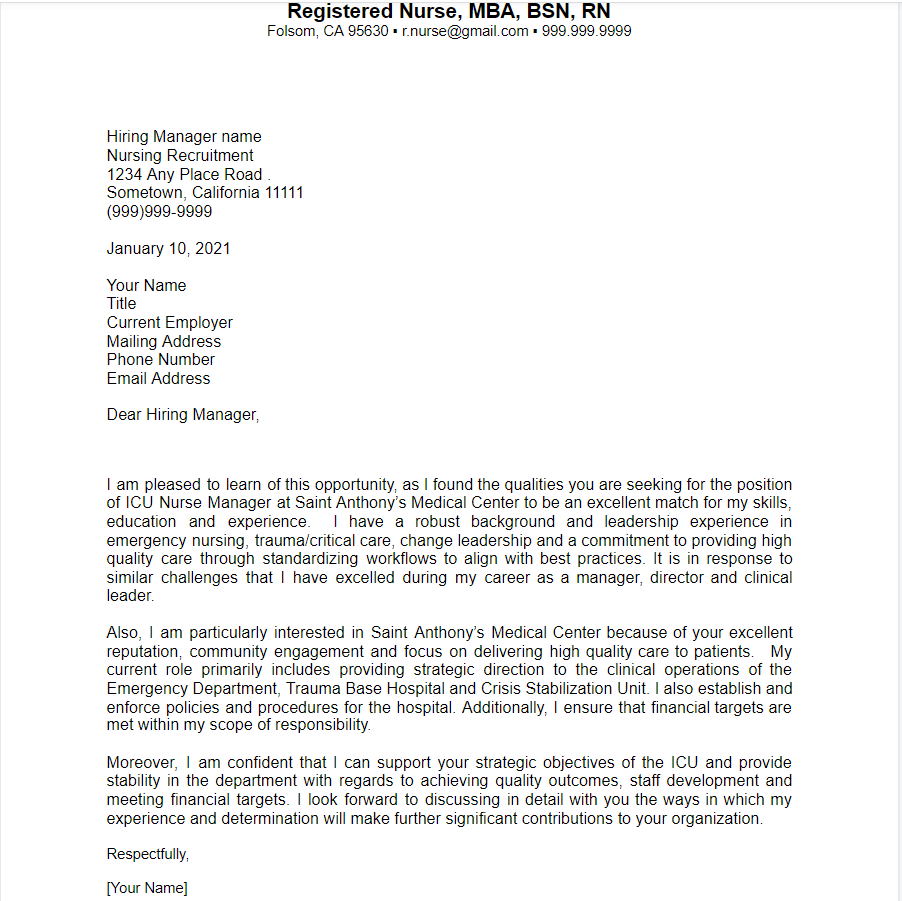
Nursing Cover Letter Template
Hiring Manager name Nursing Recruitment 1234 Any Place Road Sometown, California 11111 (999)999-9999 June 16, 2021 Your Name Title Current Employer Mailing Address Phone Number Email Address Dear Hiring Manager, I am pleased to learn of this opportunity, as I found the qualities you are seeking for this position to be an excellent match for my skills, education, and experience. I have a robust background and leadership experience in emergency nursing, trauma/critical care, change leadership, and a commitment to providing high-quality care through standardizing workflows to align with best practices. It is in response to similar challenges that I have excelled during my career as a manager, director, and clinical leader. Also, I am particularly interested in [the company] because of your excellent reputation, community engagement, and focus on delivering high-quality care to patients. My current role primarily includes providing strategic direction to the clinical operations of the Emergency Department, Trauma Base Hospital, and Crisis Stabilization Unit. I also establish and enforce policies and procedures for the hospital. Additionally, I ensure that financial targets are met within my scope of responsibility. Moreover, I am confident that I can support your strategic objectives of the ICU and provide stability in the department with regard to achieving quality outcomes, staff development, and meeting financial targets. I look forward to discussing in detail with you the ways in which my experience and determination will make further significant contributions to your organization. Respectfully, [Your Name]
Here are the most common scenarios when a nursing cover letter is required:
- Applying directly to a specific person: Suppose the job posting invites applicants to apply to a particular individual instead of a general application system. In that case, it is appropriate to include a cover letter and address it to the individual . This is especially important for new grad nurses with less experience.
- Referral for a position: Don’t skip the cover letter If you apply for work based on another professional or mentor’s recommendation. Use the cover letter to explain that someone referred you to the job and specify whom. This allows hiring managers to see that someone they value as a trusted professional in the healthcare industry believes you are qualified for a position.
- When requested in a job listing: Some job listings specifically request candidates to submit a professional cover letter with their application. Following job listing requirements to include a cover letter shows hiring managers that you follow instructions and have an eye for detail. Both are essential qualities in the nursing profession.
Benefits to Writing a Nursing Cover Letter
Knowing you are the best candidate for the job and proving it are two different things. You may have an impeccable nursing resume ; however, 20 other candidates are applying for the same position.
Nursing careers are in demand , but that does not mean there isn’t competition for specific nursing positions such as a nurse practitioner or nurse educator .
Resumes are neatly spun packages of information about a candidate’s education, job history (when applicable), and professional certification . They leave little room for information about who you are as a candidate.
That is where a good cover letter comes in. With the proper cover letter format, your cover letter will offer several advantages and is a great way to showcase your nursing skills.
Identify your intent
Resumes indicate your worth. Cover letters reveal your intent . Outline how your desires and skills align with the job you are applying for. This shows the hiring manager you are interested in the position.
Hopefully, it’s not going to be just another job for you. It will become part of your mission and vision as a nursing professional . For instance, if a position will help grow your leadership skills and prepare you for an advanced nursing career, state that as part of the intent.
Provide a more in-depth description
Your education and credentials make up only a small portion of who you are as a nursing professional. How someone looks on paper is not an indicator of how they will perform. It does not accurately gauge their character.
In that sense, a cover letter provides a sample of what the hiring manager will expect in the interview.
Using a cover letter to honestly explore your strengths, weaknesses, experiences, interests, and perspectives is an asset. Maybe your resume includes a certification or award you are proud of. Expand on it in the cover letter.
Pro-tip: Using some of the traits and terms found in the job’s job description is a great way to stand out as a candidate, as it shows you have the qualities the employer is looking for.
What makes you proud of that achievement and how does it make you the best candidate for the position?
Explain the gaps
Hiring professionals suggest resumes span one page for new nurses and those with less than 10 years of experience. Due to length limits, it is hard to explain any gaps in work history. Also, resumes leave out room for detailing why you may have shifted gears from an earlier career into nursing.
A cover letter provides the perfect opportunity to explain these situations.
Establish a willingness to work
Cover letters add an extra touch to a job application. As stated, nearly half of all job applicants fail to include a cover letter with their job applications unless requested.
Going that extra mile shows a hiring manager that you are willing to put the work in to get the job done right. That is a desirable quality for any business or industry, especially in nursing and other healthcare careers.
Remember that a cover letter should focus on a resume’s highlights, fleshing them out in a more meaningful way.
These are key purposes of a nursing cover letter.
Include only information that falls into one of the four benefits listed above to get the most mileage out of your cover letter.
Top nurse jobs on Incredible Health
🏥 nurse practitioner, cardiac care.
West Orange, NJ | $99,000 to $153,000 /year
🏥 Registered Nurse – Hospice
Arlington, MA | $75,000 to $150,000 /year
🏥 Registered Nurse – Medical Surgical/GI/Operating Room
Atlanta, GA | $60,000 to $100,000 /year
🏥 Registered Nurse – Recent Grad ICU
Dublin, GA | $40,000 to $80,000 /year
🏥 Staff Nurse (RN), Med Surg
Newburyport, MA | $75,000 to $150,000 /year
Get matched with these and thousands more permanent jobs on Incredible Health.
Steps for Writing Your Cover Letter
The nursing field requires structure and proper etiquette .
You wouldn’t walk into a patient’s room and say,
“hey, Adam, what’s up, man?”
The same need for etiquette and structure applies to writing a cover letter.
Accordingly, we have provided steps to writing a successful nursing cover letter.
1. Create a header
When a nurse injects a patient with a vaccine, they clean the area first with an alcohol wipe. They don’t just stick the needle in. In the same vein, you need to start by listing your name, phone number, email, and residential address .
Make sure you put the date under that information.
Last, include the recipient’s contact information as well.
2. Use a professional greeting

This is your first impression – show respect. Using “Dear” will work when sending a formal cover letter. If you don’t know the hiring manager’s name, simply write “Dear hiring manager.”
3. Write your opening paragraph
Your first paragraph serves as the bait or pitch to get the hiring manager’s attention. Don’t bother placing a fishing lure of fluff to try and get their attention. It’s essential to lead with honesty and earnestness.
While writing this paragraph, make sure you include the title for the position you’re applying to. If you’re applying to work as an RN , state that. Next, articulate why you applied for this job to begin with and your overall excitement to obtain this role.
Make sure that you key in on specific details about the position and how they interest you.
Here’s an example of a stellar opening paragraph:
I am thrilled at the opportunity to apply at St. Joseph’s Hospital as an ICU nurse. As an ICU nurse with over six years of experience, I have gained the necessary skills to perform my role excellently. Specifically, I am excited about the opportunity to work on a 35-bed unit with the demands it requires. I think that my experience, passion, and skill set make me an ideal ICU nurse at St. Joseph’s Hospital.
4. Write your background paragraph
Dedicate this paragraph to your career in nursing up to this point. You want to include all the most applicable skills that pertain to this position. Be specific. Include the detailed duties that you performed that correspond to this new role.
If you’re applying to work in oncology, but have training in wound therapy, maybe don’t lead with that. Try including only relevant examples.
Next, include any measurable achievements you’ve had in other jobs that relate to this role. Keyword: measurable .
Here’s an example of a job posting for an ICU nurse:
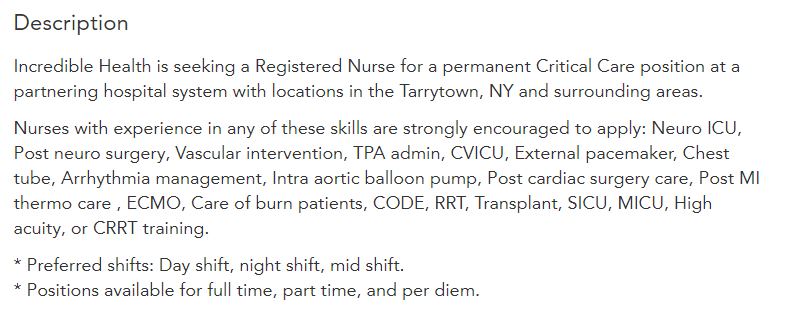
Now, here’s a great way to respond to such a job posting:
My experience as a CVICU nurse has allowed me to develop the necessary skills to provide exceptional nursing care through a continuously evolving education. One of my greatest achievements is training 10 CVICU nurses to handle the CVICU and work with external pacemakers and post-cardiac surgery care. By working alongside a variety of health care providers at all levels, I have been able to establish outstanding collaboration and delegation abilities. Through my education, a strong emphasis on patient advocacy and ethical decision-making has been incorporated. Therefore, I have learned to place patient care at the utmost importance. I have developed strong assessment and critical thinking skills. This allows me to deliver the highest quality patient-centered care.
5. Expand on qualifications
Try adding a few short stories that can highlight your primary achievements. This is a great opportunity to highlight your soft skills as well.
Some potential soft skills include:
- Communication skills
- Problem-solving skills
- Ability to work under pressure
6. Craft a conclusion
In your concluding paragraph, circle back to why you’re the best candidate for this role. Try to expand on your eagerness to obtain the position. End the paragraph with a call to action . A call to action expresses your desire to hear from them soon with next steps regarding the hiring process.
7. End your letter formally
Just like you began your letter, conclude your letter professionally with a “Sincerely” or “Respectfully,” followed by your name. Ending your letter this way helps it end on a high, formal note.
Common Mistakes to Avoid When Writing Your Cover Letter
In the nursing profession, a mistake can lead to a lawsuit. When writing a nurse cover letter a mistake could lead to you not getting a job. Below are some of the common mistakes to avoid when writing your cover letter.
- Typos: The nursing profession has a lot of difficult and wonky spellings. For example, you may be proficient at Arrhythmia management , but do you know how to spell it? Having typos within your cover letter sends the message to your hiring manager that you might not be detail-oriented and that’s one of the most important traits in a nurse.
- Focusing too much on yourself: According to Forbes, this is another common mistake to avoid . Often people try to list all their accomplishments in ways that don’t directly tie into how they can help the company . You want your cover letter to be strategic and it’s imperative to list ways that you can help the employer.
- Lying: This should be obvious but it’s crucial that you tell the truth in your cover letter. The truth will eventually come out. The best policy is to just practice honesty.
- Addressing the letter to the wrong person: This is a critical mistake. The recruiter or hiring manager probably will just stop reading at that point.
- Re-writing your resume: Unfortunately, this is a common error when writing a cover letter. As explained earlier: resumes explain your worth, cover letters show your intent. They are two separate documents and a hiring manager will know if you attempt to merge them.
- Using a different font than your resume: It may seem like a small detail, but using the same font on your resume shows that you pay attention to detail.
You’ve made it. Congratulations!
Writing a cover letter on its own separates you from the pack. However, writing a strong cover letter makes you an even more intriguing candidate. A nurse wouldn’t leave a stitch when sewing up a wound and neither should you leave a job unfinished when applying for a job.
Nursing Cover Letter FAQs
Your nursing cover letter shouldn’t be longer than a page. The recruiter should be able to read it quickly and get a good idea of what you offer the company. Anything longer than that and you risk the recruiter tossing your letter.
It’s best to use either Times New Roman or Arial when writing a nursing cover letter.
The cover letter should expand on information found in the resume. It should provide insight into your skills, qualifications and background.
- Browse jobs
- Nursing CEUs
- Interview questions
- Job search guides
- New nurse graduates
- Nurse advice Q&A
- Nurse specialty quiz
- Nurses blog
- Nursing degree guides
- Personal finance
- Resume guide
BROWSE JOBS
- Los Angeles
- Philadelphia
- San Francisco
- Washington, DC
- Schedule a demo
- Why Incredible Health
- Customer case studies
- Inside Incredible Health
- Contact & support
- New South Wales
- VET Student Loans
- Catalyst Plus Student Loans
- Supporting your success
- Training support team
- Delivery modes
- Online learning
- Practical placement
- Student resource centre
- Partner with us
- Supported placement program
- Goodstart partnership program
- School-based traineeship program
- aXcelerate Login
- Enquire now
- 1300 223 040
How to write the perfect aged care cover letter (template included)
Crafting a compelling aged care cover letter is a critical step in the job application process and can be the difference between getting an interview and being overlooked for an aged care job.
Accompanied by your resume , a well-written cover letter not only showcases your qualifications and experiences but also reflects your passion and commitment to caring for the elderly.
Starting your cover letter can be daunting, so let’s walk through the key steps you should take to create an impactful aged care cover letter tailored to the aged care sector. Plus, you can even download our free aged care cover letter sample template to get you started!

Know the role you’re applying for
Before you begin writing, take the time to understand the specific needs and values of the aged care sector, the prospective employer and the role you’re applying for.
Aged care employers look for candidates who are not only qualified but also possess a genuine empathy for the elderly, strong communication skills, and the ability to work as part of a team. Familiarise yourself with the job description and the employer’s mission to tailor your cover letter accordingly.
Start with a strong introduction
Your opening paragraph should grab the employer’s attention and clearly state the position you’re applying for. It’s also an opportunity to express your enthusiasm for the role and the organisation. It’s okay to sound keen, so don’t hold back!
Highlight relevant experience and skills
Whether you’re new to the sector or have years of experience, your cover letter should detail your relevant skills — relevant meaning that they are aligned with the role you’re applying for.
Share specific examples and achievements that demonstrate your competence in aged care. This might be your expertise in developing personalised care plans, your experience with dementia care, or your ability to communicate compassionately with residents and their families. If this is your first role in the sector, make sure you mention the experience you gained through your placement.
Showcase your adaptive skills
In aged care, adaptive or ‘soft’ skills are just as important as technical skills. Highlight the qualities such as patience, empathy, resilience, and strong interpersonal skills. Employers value candidates who can build meaningful relationships with residents and make a positive contribution to their team and workplace.
Demonstrate your passion for aged care
A little passion goes a long way in demonstrating your suitability for an aged care role, so go ahead and share some insights into why you’re drawn to the sector, or how your personal values align with the ethos of aged care. This personal touch can make your cover letter stand out.

Free aged care cover letter template
To help you get started, we’ve created a free cover letter template that is specifically written for those applying for jobs in the aged care sector.
This template will guide you in structuring your cover letter while ensuring it remains personalised and relevant to the role you’re applying for.
Crafting the perfect cover letter for the aged care sector involves more than just listing your qualifications; it’s about conveying your passion for caring for the elderly and your commitment to making a positive impact in their lives. Use these tips and grab the free cover letter sample template and you’ll be well on your way to securing a fulfilling role in aged care .
BONUS: Free Aged Care Cover Letter Template

Submit the form to download your free Aged Care Cover Letter template.
Related posts.
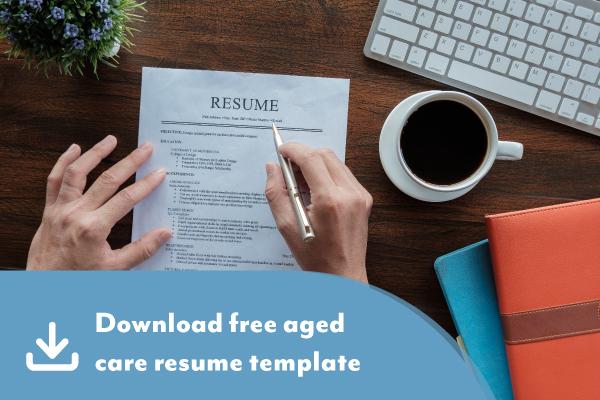
How to write the perfect Aged Care CV (template included)
In the compassionate and meaningful field of aged care, your aged care CV i...
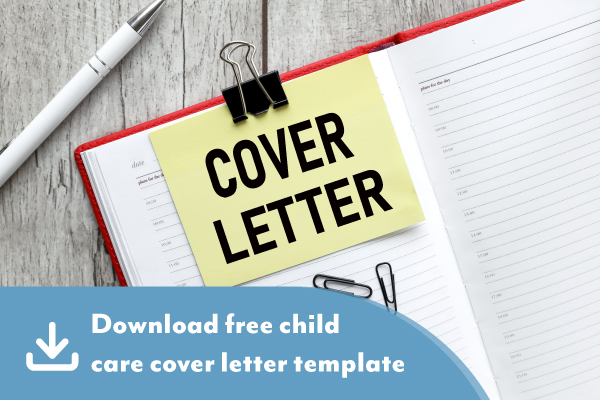
Write a great child care cover letter (plus free template)
Making the right impression matters when you’re on the job hunt, and ...
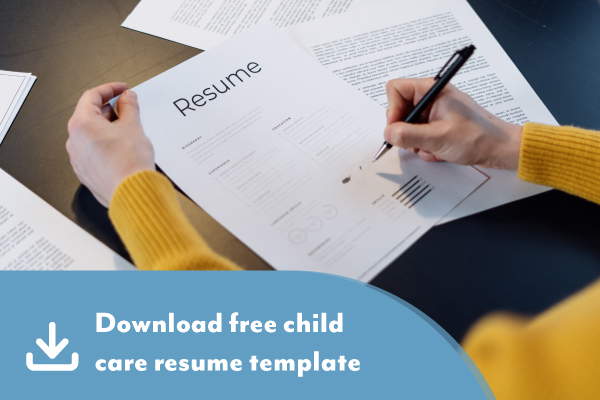
Crafting the perfect early childhood education resume (Template included)
Qualifications and a passion for supporting children to thrive are essentia...

How to make your LinkedIn profile shine
When you’re looking to kick off a career or find employment in your chose...
Make an enquiry


Build my resume
- Build a better resume in minutes
- Resume examples
- 2,000+ examples that work in 2024
- Resume templates
- Free templates for all levels
- Cover letters
- Cover letter generator
- It's like magic, we promise
- Cover letter examples
- Free downloads in Word & Docs
25 Nursing Cover Letter Samples & Writing Guide for 2024
- Nursing Cover Letter
- Nursing Cover Letters by Type
- Nursing Cover Letters by Role
- Write an Outstanding Nursing Cover Letter
Nurses tackle difficult situations for their patients, providing care under stressful circumstances. Nurses are there when patients need help with medicines, a drink, or someone to talk to.
But despite tackling the most precarious situations at work, writing a cover letter to complement a nursing resume can feel more daunting than handling a crowded emergency room. Do you even have the time and energy after a 12-hour shift?
Luckily, we can help with our nursing cover letter examples and tips that will impress any medical director. Then, polish your application off with our free resume builder and AI cover letter generator to create stunning documents in no time.

Nursing Cover Letter Example
USE THIS TEMPLATE
Microsoft Word
Google Docs
Block Format
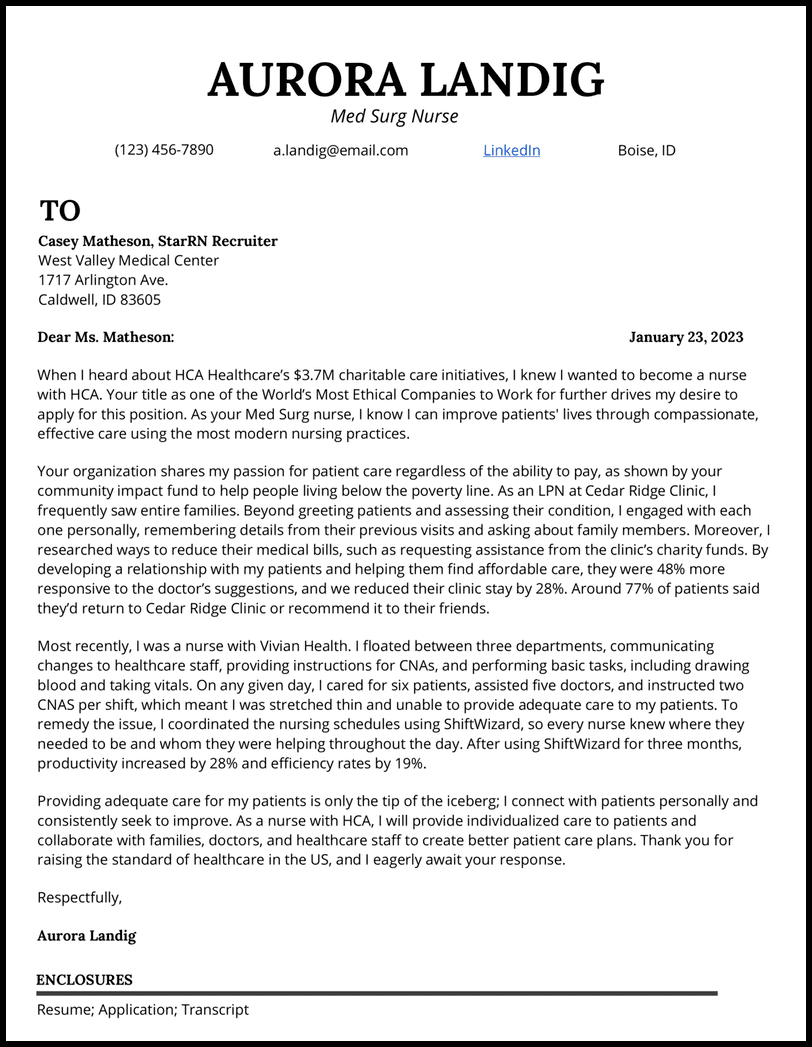
Why this cover letter works
- Especially in your opening and closing, include details like why you applied for the position, what you appreciate about the company, and what you hope to achieve in the future.
- Your cover letter isn’t the place to be modest; beyond just metrics, name things you’re good at and what you want to accomplish in your future company.
- Some good skills you can include are collaboration, leadership, and technical abilities. Just make sure your examples relate to the job description in some way.
- So long as you focus on your skills and how you can use them, you’ll exude confidence, not arrogance.
Level up your cover letter game
Relax! We’ll do the heavy lifting to write your cover letter in seconds.
Nursing New Grad Cover Letter Example

- Luca perfectly executes this in his nursing new grad cover letter by sharing his stint during Hurricane Harvey, where he helps with wound care. Personal moments like these, supported with transferable skills , can be your lever into your professional world.
Registered Nurse (RN) Cover Letter Example

- Describe a situation that reveals your expertise if relevant to the job description. Perhaps you were part of a rapid response team or alerted the doctor when a patient woke in the middle of surgery. Think back on a challenge where you emerged victorious.
- For example, if you want to be a critical care nurse, mention how your time as a forensic nurse helped you develop decision-making skills when helping patients with psychiatric disorders.
- Pick work experience according to what the employer needs. Are they looking for an ER nurse, someone with pediatric experience, or an oncology RN? Include experience within those fields.
- If you don’t have expertise in a particular area, talk about previous positions with transferable skills.
Experienced Nurse Cover Letter Example

- Here’s a bummer, though: the hiring manager doesn’t want to hear about those misadventures with friends (save them for the breakroom once you get the job, not your application). But a heartfelt snippet about that visit to a local hospital years ago painting a picture of the moment you knew nursing was your calling? That’s the kind of story that grabs hold and doesn’t let go.
Nursing Preceptorship Cover Letter Example

- You want to keep your nursing preceptorship cover letter concise, ideally to a single page. And it’s not just about brevity; it’s respect for the recruiter’s time and demonstrating your ability to prioritize and articulate information well. Even so, focus on what matters—your qualifications, passion for the practice, and readiness to contribute to the facility). Otherwise, you’ll get the same response you got last time—the heartbreaking silence.
Nurse Manager Cover Letter Example

- Take James, for example. He doesn’t just mention his job duties; he dives into a story about spearheading a data integration project that reduces time-to-insight by 16%. And he doesn’t stop there—see how he layers on other must-have skills for a nurse manager (we’re talking communication, decision-making, and team coordination). You don’t want to be just in the running but leading the pack for that coveted interview.
Nursing Instructor Cover Letter Example

- The hiring institution wants to see how you nurtured nursing students and generated an impact. So, go ahead and paint the town red with anecdotes of meaningful student engagements and measurable outcomes (Cue improving program completion rate by 8%).
ICU Nurse Cover Letter Example
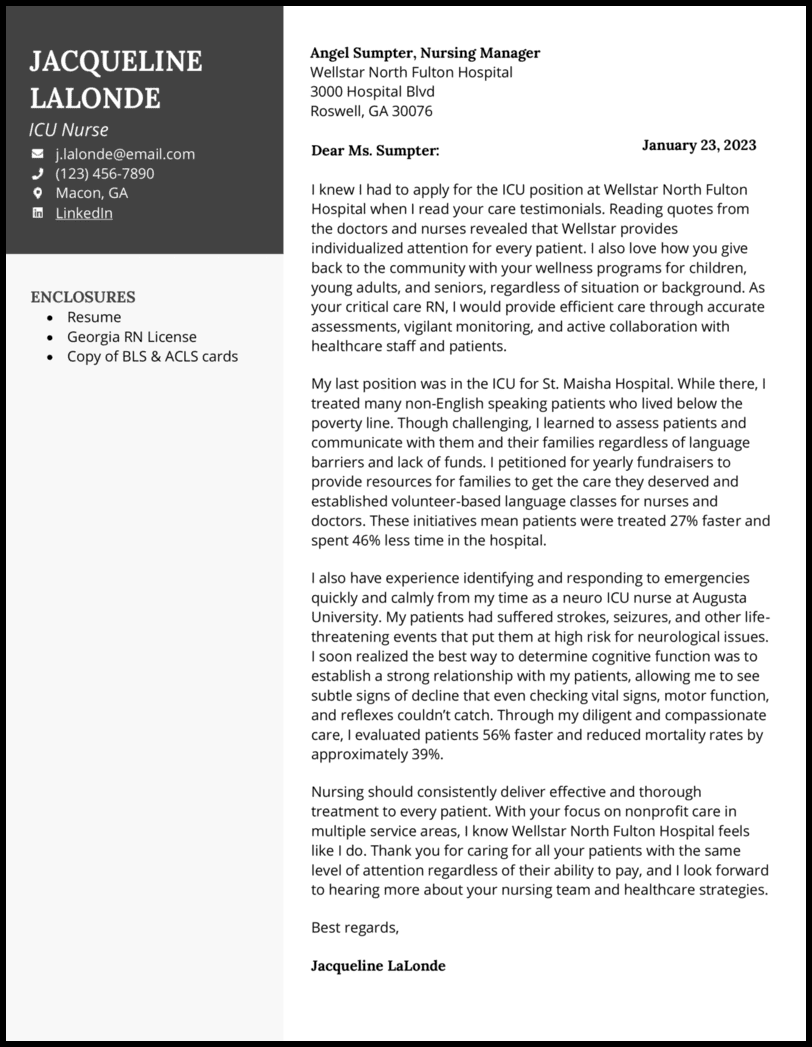
- Once you know what you do differently, you can measure your results against others and find the numbers you need for your ICU nurse cover letter.
- Double-check for special requirements, like a copy of your BLS and ACLS cards.
Director of Nursing Cover Letter Example

- So, here’s the thing: unlike your resume, your director of nursing cover letter doesn’t have a skills section, making bringing them to life in a recount your best, if not only, option. Like, say you championed an initiative to save time, and boom, that’s flaunting your teamwork skills right there (a must-have interpersonal soft skill for any leadership role).
School Nurse Cover Letter Example

- Got a Master of Science in school nursing? Flashing it in your school nurse cover letter isn’t just dropping another credential; it communicates that you’ve devoted time to acquiring the knowledge required to practice and yield desirable results. That might just be the final push needed for the hiring manager to pick up the phone and dial your number.
Labor and Delivery Nurse Cover Letter Example

- It’s simple: consider what the hiring organization is looking for and demonstrate how transferable skills mastered from previous roles translate into the role. The critical thinking, meticulous organization, and ability to perform under pressure cultivated in my previous role… from Sofia’s cover letter makes for an excellent example of this strategy in action.
Nursing Residency Program Cover Letter Example

- Sprinkle some personal touch into your piece. How, you wonder? Swap out the impersonal tone for a hearty first person (I) and go ahead to express your aspirations for the role. After all, you’re selling yourself and you’ve got to capitalize on every chance to say “Hey, I’m not just another application but someone deeply passionate about joining your team.”
Pediatric Nurse Cover Letter Example

- There’s no magic tech that lets you edit your cover letter once you release it to the recruiter, so before that, read it carefully, word for word, to ensure that it’s free of errors. And if you’re falling short of confidence, don’t hesitate to leverage Grammarly or other spell checkers.
Emergency Nurse Cover Letter Example

- But then, what’s the right way to address recruiters? First, steer clear of hey and hi — they’re just too casual. Instead, use dear like Aisha does. Also, do a little digging to find the recruiter’s name to stand out and let them know you took the initiative to learn more about the hiring company.
Aesthetic Nurse Cover Letter Example

- Say, for example, you led a team of 23 to achieve operational targets and reduced operational costs by 16%; put that in your aesthetic nurse cover letter. It even makes it more compelling by thrusting your exemplary leadership skills into the limelight.
NICU Nurse Cover Letter Example

- Customizing your NICU nurse cover letter is pretty easy; ensure it aligns with the target role. Let’s say, for example, the hiring organization is after specific skills. Mention and demonstrate them in your cover letter to maximize your chances.
Neonatal Nurse Cover Letter Example

- Maya’s approach is pretty commendable here. She goes beyond expressing interest, specifically praising Hartford Hospital’s “Help Me Grow” initiative and clearly states her enthusiasm to further their mission. That screams someone already on board with the team’s vision.

Dental Nurse Cover Letter Example

- Jump in with a positive (and intriguing) fact that shines a light on your personal connection with the practice. For instance, Kai opens with “Growing up, I was fascinated by the impactful role compassionate healthcare professionals play in nurturing young smiles.” Now, that isn’t just an intro; think of it as an attention-grabbing headline that sets you miles apart from the rest.
Operating Room Nurse Cover Letter Example

- Ideally, pick a two-column operating room nurse cover letter template. For an added flair, bold your first name, the hiring manager’s, and the date, then use a different font color for your last name. Harness such subtle enhancements not for aesthetics, but to showcase your organizational skills.
Psychiatric Nurse Cover Letter Example

- For your case, go for a standard professional font (think Arial, Cambria, Calibri, Times New Roman, etc.) to ensure it’s neat and legible and lessen the recruiters’ eye strain to make a positive impression.
Charge Nurse Cover Letter Example

- Ace that first paragraph by kissing up to the company you’re applying to. For example, Clara goes with, “ Diving into the feedback from over 2,903 staff on Indeed and the impressive 3.7 rating from more than 1,778 votes on Glassdoor, I was captivated by the positive reflections of…” A cakewalk, right?
Travel Nurse Cover Letter Example

- But don’t stop at the praises. Show how you can boost the hiring establishment’s reputation, with your narration coming across as professional and authentic. You want to focus on putting your proficiencies and skills under the limelight, aligning with the need for versatility and adaptability in travel nursing.
Nurse Case Manager Cover Letter Example

- To ensure you don’t miss out on a wonderful opportunity, always include your up-to-date professional contact information prominently at the top of your nurse case manager cover letter. And that includes your name, email address, phone number, and LinkedIn profile link. Simply put, make it easy for the prospective employer to reach you.
Nursing Faculty Cover Letter Example

- Ready to capitalize on the rev-chron layout for your nursing faculty cover letter? Here’s how to do it: describe your most recent job and go backward; most recruiters have a thing for this format because it aligns with modern hiring practices. Plus, they don’t have to try too hard to find the candidate’s deets.
Acute Care Registered Nurse Cover Letter Example

- You probably have a desired salary range in mind but mentioning it can be off-putting, alongside telling the hiring manager when they should call you or anything else you expect from them. Remember, presumption is the quickest path to losing the race.
Does your nurse resume need a little TLC?
Hopefully, our cover letters have given you the confidence you need to personalize your own. Don’t neglect your nurse resume, though, because we’ve got tons of resume samples you can edit—just like this one here.
Nursing Resume
Need a resume to pair with your nursing cover letter?
or download as PDF

3 Tips for Writing an Outstanding Nursing Cover Letter

As a nurse, you know the value of research, critical thinking, and compassionate care for each patient, but did you know you can use those same skills to write your cover letter?
All you need is to research the company, share relevant successes, and monitor your tone to create a cover letter that will catch any manager’s eye.
Tip 1: Get to know the organization
You wouldn’t walk into a patient’s room without knowing their medical history, so you shouldn’t write a cover letter without some research first. But don’t worry—this research is far easier than studying for the NCLEX exam.
Start by looking at the job description and the company’s website. Once you know what the employer needs, find a way to incorporate their requirements into your cover letter.
Does the company need a certified nephrology nurse? Be sure to mention your time in a dialysis clinic. Do they want someone experienced in labor and delivery? Write a paragraph about your previous position as a midwife.
Don’t forget: similar to how you customize your care for each patient, you should customize your cover letter for each new position. Employers will have different requirements even if you’re applying for niche roles.
Tip 2: Go a few steps further than your resume
Repetition is usually good, but not regarding your cover letter and resume. Both are essential documents, but they should support, not mimic, each other.
Your cover letter is the best way to show your personality, which is especially important in nursing. Your employer needs to determine more than just your qualifications; they’ll want to know you’ll work seamlessly with their team.
To achieve this, include any experience and skills you have solving complex medical problems or times when your personality traits significantly improved your patients and the organization.
If you’re wondering where to start, look at this example from one of our cover letters:
As an LPN at Cedar Ridge Clinic, I frequently saw entire families. Beyond greeting patients and assessing their condition, I engaged with each one personally, remembering details from their previous visits and asking about family members. Moreover, I researched ways to reduce their medical bills, such as requesting assistance from the clinic’s charity funds. By developing a relationship with my patients and helping them find affordable care, they were 48% more responsive to the doctor’s suggestions, and we reduced their clinic stay by 28%.
Although this example includes metrics and responsibilities, it also underscores the nurse’s compassion and interpersonal communication skills, which are major green lights for employers.
Tip 3: Tone is everything
Nursing relies heavily on decorum and empathy, so your cover letter should sound professional and compassionate, but where do you start? Let’s walk through it step-by-step.
For example, a local hospital needs a pediatric nurse who’ll care for special needs children. Working with challenged children requires patience, high emotional intelligence, and strong critical thinking skills, so you’ll want to reflect those abilities.
To do so, start by picking what experience to include and what to omit to keep your cover letter to one page. Any longer, it will likely be thrown into the recycle bin since recruiters and managers have limited time.
Once you’ve condensed, work on adopting a kind tone. Use words with positive connotations, limit jargon, and adjust your syntax to be direct (but not blunt). Think of it this way: you’re trying to demonstrate your ability to communicate with anyone, so your writing needs to be understandable, easy to read, and compassionate.
Use words with positive connotations, limit jargon, and adjust your syntax to be direct (but not blunt) .
But don’t stress if you haven’t found the right words yet; revision is the next step. Ask someone to read it through, find any grammatical or punctuation errors, and determine if they would hire you based on what you’ve written.
Use Our Informative Outline to Start Your Nursing Cover Letter

Any great strategy needs a solid structure to make it succeed; use our outline to plan your cover letter for your next nursing role.
How to start a nursing cover letter
Your contact info: If your employer doesn’t know how to contact you, they can’t hire you. Don’t leave them in the dark—include your address (city and state) and phone number.
- Formatting : Leave your name out of your address if using a block format.
Date: Every letter needs a date, even a cover letter. Include the date near the top, and make sure it reflects the day you submit, not the day you started writing.
- Formatting : Write the full date, e.g., January 5, 2023.
Inside address: An inside address is the employer’s address, including the hiring manager’s name and title, plus the medical organization’s physical location.
It may sound silly to include the employer’s location since they’re reading the letter, but it adds credibility. Addressing the manager by name and listing their location demonstrates your research, especially if there are multiple locations within the organization.
Casey Matheson, StarRN Recruiter West Valley Medical Center 1717 Arlington Ave. Caldwell, ID 83605
- Formatting : Each part of the address should be on a new line. Double space between the inside address and greeting to make it aesthetically pleasing.
Greeting: A proper salutation is always a good idea in a cover letter. Since most healthcare organizations are pretty formal, use the standard “Dear Ms./Mr.” followed by the manager’s name.
We know this isn’t always as easy as it sounds. Finding the person in charge of hiring at your clinic, hospital, physician’s office, or other healthcare location can be as difficult as getting an IV in a deep vein.
However, don’t skip over this step because it’s hard. This small inclusion demonstrates your research; everyone likes personal acknowledgment, so it’s a win-win. We recommend scouring LinkedIn or the company’s website and medical job boards to find details about the company and its employees.
- Formatting : Use a colon after the greeting instead of a comma per business standards.
Dear Ms. Matheson:
How to write your nursing cover letter
Body: The body of your nursing cover letter should be three to four paragraphs that convey your eagerness for the job, qualifications, and interest in further discussion.
Opening paragraph: Nursing can be thrilling, but you’d be surprised at how many cover letters make it sound like the most boring job in the world, starting with the opener.
Many opening paragraphs sound downright sterile and robotic, like this one:
Good day—my name is Laura Howell, and I am inquiring about the Travel Med Surg RN position. I have four years of experience in the healthcare industry and the necessary knowledge and skills to help your organization take better care of its patients.
Besides including their name, this opener is entirely depersonalized and generic. Having several years of experience means nothing if you don’t qualify or quantify it, and nothing about this opening suggests real passion for the company (or even nursing in general).
Instead, mention the organization by name and explain why you’re interested in the position:
As a nurse, I always want to provide safe, quality care to every patient, which Natchaug Hospital embodies. Your success stories about helping others with addictions and mental illnesses convinced me that your hospital truly upholds the values of equity, safety, and integrity. I am confident that as an RN at Natchaug Hospital, I can lead my fellow nurses, develop modernized treatment plans, and collaborate with healthcare staff to make our patient’s experience more effective and comfortable.
In just one paragraph, you can quickly tell the candidate’s passion for nursing, their goals as a nurse, and why they want to work at Natchaug Hospital.
Paragraphs 2-3: Your cover letter should reflect more than basic skills; nursing is more than just “preparing documentation” and “assessing patients.”
These paragraphs need to provide evidence for your assertions in the opening paragraph. Make each one a spotlight on one of your achievements.
Did you diagnose a patient when even the doctor was stumped? Did you save someone’s life through your attention to detail? Find your best moments, and don’t be shy about relaying your successes.
If you’re wondering where to start, use one of our examples as a guideline:
My last position was in the ICU for St. Maisha Hospital. While there, I treated many non-English speaking patients who lived below the poverty line. Though challenging, I learned to assess patients and communicate with them and their families regardless of language barriers and lack of funds. I petitioned for yearly fundraisers to provide resources for families to get the care they deserved and established volunteer-based language classes for nurses and doctors. These initiatives mean patients were treated 27% faster and spent 46% less time in the hospital.
Although this paragraph has metrics, it focuses on the nurse’s ability to communicate and relate to people. It’s personal without being sentimental and professional without being cold.
Closing paragraph: You are excellent at ensuring patients have what they need before leaving your care, so do the same in your cover letter. Summarize how your values and qualifications align with the organization’s needs and express your desire to discuss further.
Whatever you do, don’t leave them hanging like this:
As you can see, I have the experience and the skills to be a nurse at your location. Thank you for your time, and I look forward to hearing from you soon.
If ever there was a more generic closing paragraph than this, we haven’t found it. This closer offers nothing unique about the applicant or the business and hardly sounds enthusiastic.
Instead, give the hiring manager something to remember with details specific to you and the job:
Providing adequate care for my patients is only the tip of the iceberg; I connect with patients personally and consistently seek to improve. As a nurse with HCA, I will provide individualized care to patients and collaborate with families, doctors, and healthcare staff to create better patient care plans. Thank you for raising the standard of healthcare in the US, and I eagerly await your response.
This closer effectively concludes the conversation while demonstrating their interest in the position and why they’re the best choice for the employer.
- Formatting: Single-space your nursing cover letter but double-space between paragraphs.
Signature: End your cover letter on a high note and with a “thank you” if you haven’t already said so.
Chase Turner
- Formatting : If you’re presenting any hard copies of your nursing cover letter, quadruple space to sign your name in blue/black ink.
Enclosure(s): Adding an enclosures section is greatly appreciated in the healthcare industry. This section lists other documents you’ve included in your application, reminding the reader there’s more to come.
Nursing cover letter enclosures can include the job application, a resume, a transcript, writing samples, and licensure documents, to name a few.
Enclosures: Resume Georgia RN License Copy of BLS & ACLS cards
- Formatting : Use the singular or plural form of “enclosure,” depending on how many things you attach.
Check the Health of Your Nursing Resume

Congrats, you’ve finished your nursing cover letter! You’re one step closer to the nursing job you’ve always wanted.
But wait—don’t forget you still need to write a resume . Whether you need to build an outline of a resume or are in the finishing stages of filling out a resume template , we have the tools you need to write a great nursing resume.
If you’re finding it hard to start, you can edit this nurse resume directly.
ICU Nurse Resume

No matter where you’re at in the job hunt, remember: you’re a great nurse, and your patients know it. Now go out there and prove that with a stellar resume and cover letter!
Ideally, you should connect with your role as a nurse and the type of medical organization you’re applying to. For instance, if the position involves providing care to elderly patients, then connecting with why you want to help elderly patients maintain a good quality of life and minimize pain could be great points to focus on.
You can lean on how your associate’s or bachelor’s degree in nursing has equipped you to be successful in the role, such as how you achieved excellent grades in your pathophysiology classes. Also, connect your passion to the role and desire to help others as much as possible to stand out.
Nurses need a large skill set, but detailing every ability you possess in your cover letter wouldn’t be the best idea since it would likely lose a hiring manager’s attention. Instead, focus on the primary needs of the job. Will you be in an emergency response sector? Then focusing on skills like wound dressing or controlling bleeding may be essential to emphasize within your cover letter.

How to Write a Nursing Cover Letter That Stands Out + Examples
- Do You Need One?
- What to Include
- 6 Common Mistakes
- Cover Letter Template
- Cover Letter Example
- Don't Forget It!

You're not alone if you think writing a nursing cover letter is intimidating. However, a great cover letter may be the difference between landing the job or having your application ignored.
Keep reading for expert advice regarding the importance and benefits of writing a nursing cover letter and common mistakes to avoid, and some examples you can use!
Do You Need Nursing Cover Letters?
The cover letter is your chance to highlight your past experience and let the hiring manager know why you believe you're the best fit for the role. The hiring manager will quickly notice you are motivated and enthusiastic about the job prospect.
It's also your first chance to show your articulation and communication skills. A well-crafted cover letter makes an impression that instantly sets you apart from other applicants.
Benefits of Writing a Nursing Cover Letter
Most candidates don't take the time to create a cover letter. In the world of online applications, attaching one is usually optional and feels like extra work. So many applicants fill out the bare minimum and move on to the next job posting.
Stand out from the competition - Write a killer cover letter.
Why you should take the time to create your cover letter
- Increase chances your application is reviewed
- Highlight your accomplishments, skills, and qualifications
- Showcase your personality and communication skills
- Make a great first impression
- Show your interest in the position/company
Your resume is important, but the cover letter sets the tone for your entire application. Check out our Ultimate Guide to Nursing Resumes to learn more about current resume etiquette and trends.
Writing a nursing resume can feel overwhelming. It’s no easy task! Nowadays, nursing resumes must be able to pass through resume reading software before it even reaches a recruiter. That’s why we’ve put together THREE nurse resume templates to cater to your unique professional needs and employment situation.

By clicking download, you agree to receive email newsletters and special offers from Nurse.org. You may unsubscribe at any time by using the unsubscribe link, found at the bottom of every email.
Your request has been received. Thanks!

What to Include in Your Nursing Cover Letter
Did you learn how to write business letters in school? Have you forgotten everything about how to format them? You’re not alone - we’ve got your back here at Nurse.org.
Let's go through the basic format of a nursing cover letter that can be used at any stage of your professional development, including entry-level and specialty changes.
The header is simple; it’s just contact information for both you and the hiring organization. The basic format is:
Phone Number
Email Address
Street Address
- City, ST, Zip Code
Hiring Manager (Use name if possible)
- Healthcare Organization
The best advice here is to find out the hiring manager's name so you can personalize the greeting.
How to find out the name of a hiring manager:
- If you have a connection in the organization, ask who will review your application.
- Review the company website or LinkedIn to find the manager or director for the position.
- Call the Human resources department. This can be hit or miss, but it's worth a shot if you haven't found the right person.
Generic greetings should be your last resort. If you've tried and still can't find the name, "Dear Hiring Manager" or "Dear Nursing Recruitment Team" will work. You'll wow them with the rest of your letter.
Paragraph #1: Opening
In the opening paragraph, identify the position you're applying for and briefly state why you're a good fit. HR and hiring managers often look at resumes for several positions, so this is a chance to remind them that you are applying for X opportunity. It signals the hiring manager to read the rest of your letter and resume with that position in mind.
Paragraph #2: Background & Qualifications
Your qualifications paragraph is the most important one in your cover letter. Briefly summarize your background, skills, and traits that make you the perfect candidate for the position in about 2-3. Use keywords from the posted job description that complement your skill set. You can also use bullet points to make this paragraph stand out.
Note for new grads: All of your background experience is valuable. Suppose you don't have healthcare-specific work experience. In that case, you can highlight customer service skills, eagerness to learn new processes, and highlights from nursing school clinical experiences.
Notes for nurses transitioning to new specialties: Give a brief career synopsis and highlight the skills you think will best transfer to the new specialty. Emphasize strengths that align with the job position posting.
Paragraph #3: Compliment the Organization
Your final paragraph shows you're serious about the position. Research the organization and state why you want to join their team. You can find great information and keywords to use on the job post or their website.
Closing the Nursing Cover Letter
Your closing sentence is brief and invites further conversation. Restate your contact information and Invite the hiring manager to discuss the role further. Then, add in a final closure and your signature. Congratulations, your letter is complete!
The closure should be respectful and professional. Examples include
- Respectfully
- Sincerely yours
- Yours truly
- With warm regards
- Best regards
How to List Your Nursing Credentials
It’s easy to get confused about how to list your nursing credentials. The correct way to sign your name with credentials is:
[Name], [Highest level of education completed], [License type], [Certifications]
Jane completed an associate degree and is a Registered Nurse without other certifications (yet). Her signature is Jane Doe, ADN, RN
If Jane goes on to complete her BSN and Pediatric certification, her signature changes to: Jane Doe, BSN, RN, CPN
We’ve got templates below to help you get started, but first let’s review some common mistakes you should avoid.
6 Common Mistakes to Avoid When Writing Your Nursing Cover Letter
Writing a great nursing cover letter may seem daunting, but the process does get easier with practice. Here are a few common nursing cover letter mistakes and pitfalls to avoid.
1. Leaving Grammatical Errors and Typos
Most programs have some spell and grammar check capabilities, but don't rely on them alone. Websites such as grammarly.com offer free proofreading and grammar review. Make sure to review that all names are correctly spelled.
2. Using a Generic Greeting
Do your research to find the hiring manager’s name. If you can’t find it, open the letter with “Dear Hiring Manager.” Avoid “To whom it may concern” at all costs.
3. Forgetting to add Keywords
Read the job description carefully. Find keywords that relate to your experience and use them throughout the cover letter.
4. Not Following Instructions
Follow any specific requirements listed in the job description or application website. If the listing says to upload your cover letter as a PDF, save your document as a PDF before submitting it.
This is your first test to see if you pay attention to detail and follow directions. Don't fail before you even get started!!
5. Using the Same Cover Letter for Different Jobs
Each position and organization are unique; don’t repeatedly use the same letter. However, you also don't need to start from scratch each time!
Save your cover letters as you write them so they’re available to edit next time. Highlight different skills if needed. Make it personal to the new position by including keywords from the job listing.
6. Forgetting to Proofread and Edit
Notice how #1 and #6 are almost identical? It’s on purpose - proofreading is the most critical aspect of writing. Here are some tips to help you make sure your cover letter is perfect:
Read your letter out loud. Does it make sense? Do any of the sentences sound strange when you read them out loud?
Walk away . Putting a bit of time between writing and finalizing your edits can make a world of difference in the final draft.
Enlist a friend. Ask a trusted friend, career advisor, or faculty member to read the letter before you hit send.
Nursing Cover Letter Template
Here’s everything your nursing cover letter should include.
City, State, Zip Code
Healthcare Organization Name
Telephone Number
Email address
Dear (Mr. Mrs. Ms.) ________,
Dear Nursing Recruitment Team,
Opening: 2-3 sentences that express your excitement. Name the exact position you are applying for and the organization. Briefly state why you are the best fit.
Background & Qualifications: 2-4 sentences to highlight your applicable certifications, achievements and strengths. You may use bullet format to draw attention to this section.
Compliment the Organization: 2-3 sentences to show you’ve researched the organization and position. Highlight organizational values that align with yours.
Closing sentence: Thank the hiring manager for taking time to review your application. Invite them to contact you to arrange an interview.
With warm regards,
Your Name, (credentials)
Example Nursing Cover Letter
(718) 555–0100
123 Main Street;
City, ST 12345
August 01, 2023
Hailey Johnson
Human Resources
Mercy Healthcare
123 Broadway Ave; City, ST 12300
Dear Ms. Hailey Johnson,
I am excited to apply for the Registered Nurse residency program at Mercy Healthcare. I recently graduated with my Bachelor of Science in Nursing and believe the skills and knowledge gained during nursing school will be highly valuable to your team.
I received excellent clinical reviews throughout nursing school and graduated with honors. I have excellent time-management skills and look forward to further developing hands-on skills through clinical practice. My ability to coordinate tasks and collaborate with others allows me to provide excellent patient care.
Mercy Healthcare is well-known for patient-centered care and shared governance. I look forward to making a difference in patients’ lives through compassion, dedication, and excellent nursing care.
Thank you for considering my application. I can be reached at (718) 555–0100 or [email protected] to arrange an interview and further discuss my qualifications.
Ava Smith, BSN, RN
Don't Forget Your Cover Letter!
Always, always, always attach a cover letter to your job applications. These templates should help you get started. Attaching a cover letter immediately sets you apart from the candidates who do not take the time to write or attach one. Highlight your strengths and show the hiring manager that you’re serious about the position. Then start prepping your answers to common interview questions for when you get that call.

Joleen Sams is a certified Family Nurse Practitioner based in the Kansas City metro area. During her 10-year RN career, Joleen worked in NICU, inpatient pediatrics, and regulatory compliance. Since graduating with her MSN-FNP in 2019, she has worked in urgent care and nursing administration. Connect with Joleen on LinkedIn or see more of her writing on her website.

Plus, get exclusive access to discounts for nurses, stay informed on the latest nurse news, and learn how to take the next steps in your career.
By clicking “Join Now”, you agree to receive email newsletters and special offers from Nurse.org. We will not sell or distribute your email address to any third party, and you may unsubscribe at any time by using the unsubscribe link, found at the bottom of every email.

- CHC33021 Certificate III in Individual Support (Ageing)
- CHC43015 Certificate IV in Ageing Support
- Disability Service
- CHC33021 Certificate III in Individual Support (Disability)
- CHC43115 Certificate IV in Disability
- Community Services
- CHC43315 – Certificate IV in Mental Health
- CHC42015 Certificate IV in Community Services
- CHC52015 Diploma of Community Services (Case Management)
- CHC62015 Advanced Diploma of Community Sector Management
- Early Childhood Education
- CHC30121 Certificate III in Early Childhood Education and Care
- CHC50221 Diploma of School Age Education and Care
- CHC50121 Diploma of Early Childhood Education and Care
- BSB50420 – Diploma of Leadership and Management
- BSB60420 Advanced Diploma of Leadership and Management
- BSB50920 Diploma of Quality Auditing
- CHCSS00098 – Individual Support – Disability Skill Set
- CHCSS00114 – Entry into Care Roles Skill Set
- CHCSS00073 – Case Management Skill Set
- CHCSS00094 – High Support and Complex Care – Disability Skill Set
- CHCSS00096 – Disability Work – Behaviour Support Skill Set
- First Aid Courses
- [Domestic Enrolment Form]
- Aged Care and Disability
- CHC33021 Certificate III in Individual Support – Ageing & Disability
- CHC43121 Certificate IV in Disability Support
- CHC42021 Certificate IV in Community Services
- CHC52021 – Diploma of Community Services
- BSB50420 Diploma of Leadership and Management
- [International Enrolment Form]
- QLD Job Trainer
- Certificate 3 Guarantee Program
- Queensland Higher Level Skills
- User Choice
- School Based Traineeships
- University Pathways
- Roles and Responsibilities
- Industry Partners
- Forms & Policies
- Recent News
- COVID-19 Safety
How to Write a Resume and Cover Letter for Aged Care Roles
If you are targeting a career as an Aged Care Worker/ Assistant in Nursing/ Personal Care Assistant or similar, you may be wondering how to prepare your resume and cover letter.
The following resume and cover letter guide will help you prepare your application.
Your Resume
Your resume should be a succinct, professional document which outlines your skills, qualifications and experience. Nicole Wren, of Resumes to Impress , suggests you aim for 2-3 pages in length. It should include the following sections (usually in this order):
Personal Details
In this section, you will need to put your contact details, including your full legal name, phone number and email address. Your home address is optional.
In this section, you will need to highlight the skills you have relevant to the aged care industry. Focus on skills like communication, teamwork and empathy – all the qualities that will make you an excellent Aged Carer.
Education/ Qualifications
Relevant qualifications are critical to your success in gaining employment as an Aged Carer. A Certificate III in Individual Support (Ageing) or similar is usually the requirement, and it is important that you highlight this qualification in your resume (and cover letter). Include details of placements you have completed within this qualification. You should also include other relevant qualifications if you have them.
Employment History/ Achievements
Nicole notes that in general, Australian employers prefer the chronological resume format. This means your most recent work experience goes first. Remember to use the full month and year you worked in each role e.g., January 2017 – March 2022. When detailing your employment history, try and focus on the tasks you completed which highlight your transferrable skills to the aged care sector. For example, what did you do in those roles that required empathy? What tasks required teamwork? How did you show your cultural sensitivity? Rather than simply writing out a list of your duties, try and think of some achievements for each role – times when you went ‘above and beyond’. This is how your resume will truly stand out.
Your resume should include two professional referees who can vouch for your work ethic. Consider using placement supervisors to report on your skills in aged care.
Your Cover Letter
Your cover letter is your opportunity to ‘introduce’ yourself to a future employer. You should consider it a formal document but also inject a bit of your personality in it, too. Wherever possible, find the name of the hiring person and address the cover letter to them, personally (according to Nicole, you should avoid ‘To Whom It May Concern’ if you can). Outline your motivation for the role – tell them what makes you want to work as an Aged Carer for this particular organisation. Want to truly impress them? Link your motivation to the values of the organisation (you can usually find these on their website).
Once you have developed your resume and cover letter, be sure to read through them thoroughly before submitting them and make sure they are free of spelling and grammar issues. Consider asking a trusted friend or colleague to review it for you, too.
Congratulations! You are well on your way to getting that job in aged care that you have been working towards.

Aged Care Worker Cover Letter Sample
Aged Care Workers work in healthcare facilities and private households where they are required to look after the elderly to assist them in living a dignified life and bring them back to a healthy life.
People working in this capacity should be proactive, compassionate, and self-driven as they need to exercise a lot of patience and need to be ready for emergencies.
In order to get a job as an aged care worker, you will need to craft a resume and a cover letter.
Below is a sample cover letter for an aged care worker’s resume to guide you in this regard.
Sample Cover Letter for Aged Care Worker Position
Thomas Johnson 1287 Maple Avenue Newport, RI 36985 (000) 999-6258 thomas @ email . com
May 24, 2022
Mr. Anthony Parker Manager HR Sava Senior Care 9642 Caporal Street Newport, RI 38474
Dear Mr. Parker:
Your job advertisement on indeed.com depicts that you are looking for an energetic person to fill your aged care worker position. I deem myself an excellent candidate for this position because I possess relevant experience, compassion, and a calm temperament to work effectively with the elderly.
Since I have worked for older adults for almost five years now, I am familiar with the ins and outs of this job. I comprehend that it is often challenging to work with residents who are suffering from dementia, Alzheimer’s, or other disorders; I strive hard to understand each resident’s ailment and manage to work with them accordingly. Moreover, I have a strong knowledge of medication administration and CPR, and First Aid; I am on my toes all the time where resident care is concerned.
I look forward to meeting with you to discuss your requirements and my competencies in detail. I will call your office next week to find the suitability of my candidacy. Please feel free to call me at (000) 999-6258 if you need any additional information.
Thank you for your consideration.
Thomas Johnson
- 10 Aged Care Worker Resume Objective Examples
- Aged Care Worker Resume Sample
- Aged Care Cover Letter Example With No Experience
- Top 8 Objectives for Aged Care Nursing Resume
Leave a Reply Cancel reply
Your email address will not be published. Required fields are marked *
Notify me of new posts by email.
Aged Care Registered Nurse resume templates
Download a resume template.
- 1 . Download one of our free resume templates.
- 2 . Tailor your resume with your skills, experience and contact details.
- 3 . Review your resume before saving it as a PDF. Then you’re ready to start applying with it!
More tips to improve your resume and help you stand out
- Examples of good and bad resumes
- This is what a great resume looks like
Skills and experience employers are looking for
Latest aged care registered nurse jobs on seek.
Privacy preference center
We care about your privacy
When you visit our website, we will use cookies to make sure you enjoy your stay. We respect your privacy and we’ll never share your resumes and cover letters with recruiters or job sites. On the other hand, we’re using several third party tools to help us run our website with all its functionality.
But what exactly are cookies? Cookies are small bits of information which get stored on your computer. This information usually isn’t enough to directly identify you, but it allows us to deliver a page tailored to your particular needs and preferences.
Because we really care about your right to privacy, we give you a lot of control over which cookies we use in your sessions. Click on the different category headings on the left to find out more, and change our default settings.
However, remember that blocking some types of cookies may impact your experience of our website. Finally, note that we’ll need to use a cookie to remember your cookie preferences.
Without these cookies our website wouldn’t function and they cannot be switched off. We need them to provide services that you’ve asked for.
Want an example? We use these cookies when you sign in to Kickresume. We also use them to remember things you’ve already done, like text you’ve entered into a registration form so it’ll be there when you go back to the page in the same session.
Thanks to these cookies, we can count visits and traffic sources to our pages. This allows us to measure and improve the performance of our website and provide you with content you’ll find interesting.
Performance cookies let us see which pages are the most and least popular, and how you and other visitors move around the site.
All information these cookies collect is aggregated (it’s a statistic) and therefore completely anonymous. If you don’t let us use these cookies, you’ll leave us in the dark a bit, as we won’t be able to give you the content you may like.
We use these cookies to uniquely identify your browser and internet device. Thanks to them, we and our partners can build a profile of your interests, and target you with discounts to our service and specialized content.
On the other hand, these cookies allow some companies target you with advertising on other sites. This is to provide you with advertising that you might find interesting, rather than with a series of irrelevant ads you don’t care about.
Home Care Nurse Cover Letter Example
Get more job offers and get inspiration for your own cover letter with our free, editable Home Care Nurse cover letter example. Make a copy of this cover letter sample at no cost or customize it inside our intuitive cover letter builder.

Related resume guides and samples
How to create a compelling dentist resume in 2022?
How to craft the ideal medical assistant resume
How to Write a Medical Doctor CV: What to Include Section by Section
Land a job in mental health therapy with this resume guide
How to write a job-winning nurse resume
How to build an effective pharmacy technician resume
Find your dream physical therapist job with this resume guide
A quick guide to writing your veterinarian resume
Home Care Nurse Cover Letter Example (Full Text Version)
Jessica iversen.
Dear Hiring Manager,
I am writing to express my strong interest in the Home Care Nurse position at your institution. I was impressed by the job posting and believe that my patient-oriented approach, along with my extensive knowledge and experience in the industry, would make me a valuable asset to your team.
In my previous roles at CareResource and Atria Senior Living, I was responsible for a range of duties including providing medical care to senior citizens, educating patients and their families on treatment options, and maintaining confidential clinical records. I take pride in prioritizing patient satisfaction and am committed to performing my duties to the best of my abilities.
I hold a nursing degree from the University of Huddersfield and a Home Health Nursing Certification, and have honed my skills in medication administration, patient assessment, and bedside monitoring. My experience volunteering as a Special Needs Volunteer in Peru has further developed my passion for helping others.
I have attached my resume for your review and consideration. Thank you for your time and consideration.
Sincerely, Jessica Iversen

Milan Šaržík, CPRW
Milan’s work-life has been centered around job search for the past three years. He is a Certified Professional Résumé Writer (CPRW™) as well as an active member of the Professional Association of Résumé Writers & Careers Coaches (PARWCC™). Milan holds a record for creating the most career document samples for our help center – until today, he has written more than 500 resumes and cover letters for positions across various industries. On top of that, Milan has completed studies at multiple well-known institutions, including Harvard University, University of Glasgow, and Frankfurt School of Finance and Management.
Edit this sample using our resume builder.
Don’t struggle with your cover letter. artificial intelligence can write it for you..

Similar job positions
Medical Doctor Medical Assistant Veterinary Dentist Pharmacy Technician Nurse Mental Health Therapist Physical Therapist
Related healthcare resume samples

Related healthcare cover letter samples

Let your resume do the work.
Join 5,000,000 job seekers worldwide and get hired faster with your best resume yet.

Cookies on GOV.UK
We use some essential cookies to make this website work.
We’d like to set additional cookies to understand how you use GOV.UK, remember your settings and improve government services.
We also use cookies set by other sites to help us deliver content from their services.
You have accepted additional cookies. You can change your cookie settings at any time.
You have rejected additional cookies. You can change your cookie settings at any time.
Register to vote Register by 18 June to vote in the General Election on 4 July.
- Health and wellbeing during COVID-19
People with symptoms of a respiratory infection including COVID-19
Guidance for people with symptoms of a respiratory infection including COVID-19, or a positive test result for COVID-19.
Applies to England
As we learn to live safely with COVID-19, there are actions we can all take to help reduce the risk of catching COVID-19 and passing it on to others. These actions will also help to reduce the spread of other respiratory infections. COVID-19 and other respiratory infections such as flu can spread easily and cause serious illness in some people.
Vaccinations are very effective at preventing serious illness from COVID-19, however even if you are vaccinated there is a chance you might catch COVID-19 or another respiratory infection and pass it on to other people.
Who this guidance is for
Most people can no longer access free testing for COVID-19. This guidance is in 2 parts:
Actions you can take to protect other people if you are unwell with symptoms of a respiratory infection, including COVID-19, and you have not taken a test for COVID-19.
Advice for people who have taken a COVID-19 test and have received a positive test result.
There is separate guidance for people who have been informed by the NHS that they are at highest risk of becoming seriously unwell and who might be eligible for new COVID-19 treatments.
There is also additional guidance for those working in health and social care settings.
People at higher risk of becoming seriously unwell from a respiratory infection, including COVID-19
People who are at higher risk from COVID-19 and other respiratory infections include:
- older people
- those who are pregnant
- those who are unvaccinated
- people of any age whose immune system means they are at higher risk of serious illness
- people of any age with certain long-term conditions
The risk of becoming seriously unwell from COVID-19 and other respiratory infections is very low for most children and young people.
Some children aged under 2 years, especially those with a heart condition or born prematurely, as well as very young infants, are at increased risk of hospitalisation from respiratory syncytial virus ( RSV ) .
You will not always know whether someone you come into contact with outside your home is at higher risk of becoming seriously unwell. They could be strangers (for example, people you sit next to on public transport) or people you may have regular contact with (for example, friends and work colleagues). This means it is important to follow the advice in this guidance to reduce the spread of infection and help to keep others safe.
Symptoms of respiratory infections, including COVID-19
Respiratory infections can spread easily between people. It is important to be aware of symptoms so you can take action to reduce the risk of spreading your infection to other people.
The symptoms of COVID-19 and other respiratory infections are very similar. It is not possible to tell if you have COVID-19, flu or another respiratory infection based on symptoms alone. Most people with COVID-19 and other respiratory infections will have a relatively mild illness, especially if they have been vaccinated.
If you have symptoms of a respiratory infection, such as COVID-19, and you have a high temperature or you do not feel well enough to go to work or carry out normal activities, you are advised to try to stay at home and avoid contact with other people.
Symptoms of COVID-19, flu and common respiratory infections include:
- continuous cough
- high temperature, fever or chills
- loss of, or change in, your normal sense of taste or smell
- shortness of breath
- unexplained tiredness, lack of energy
- muscle aches or pains that are not due to exercise
- not wanting to eat or not feeling hungry
- headache that is unusual or longer lasting than usual
- sore throat, stuffy or runny nose
- diarrhoea, feeling sick or being sick
If you are feeling unwell with these symptoms you should get plenty of rest and drink water to keep hydrated. You can use medications such as paracetamol to help with your symptoms. Antibiotics are not recommended for viral respiratory infections because they will not relieve your symptoms or speed up your recovery.
In some cases, you might continue to have a cough or feel tired after your other symptoms have improved, but this does not mean that you are still infectious.
You can find information about these symptoms on NHS.UK .
If you are concerned about your symptoms, or they are worsening, seek medical advice by contacting NHS 111. In an emergency dial 999.
What to do if you have symptoms of a respiratory infection, including COVID-19, and have not taken a COVID-19 test
Try to stay at home and avoid contact with other people.
If you have symptoms of a respiratory infection, such as COVID-19, and you have a high temperature or do not feel well enough to go to work or carry out normal activities, try to stay at home and avoid contact with other people, until you no longer have a high temperature (if you had one) or until you no longer feel unwell.
It is particularly important to avoid close contact with anyone who you know is at higher risk of becoming seriously unwell if they are infected with COVID-19 and other respiratory infections, especially those whose immune system means that they are at higher risk of serious illness, despite vaccination .
Try to work from home if you can. If you are unable to work from home, talk to your employer about options available to you.
If you have been asked to attend a medical or dental appointment in person, contact your healthcare provider and let them know about your symptoms.
You may wish to ask friends, family or neighbours to get food and other essentials for you.
If you leave your home
If you leave your home while you have symptoms of a respiratory infection, and you have a high temperature or feel unwell, avoid close contact with anyone who you know is at higher risk of becoming seriously unwell, especially those whose immune system means that they are at higher risk of serious illness, despite vaccination .
The following actions will reduce the chance of passing on your infection to others:
- wearing a well-fitting face covering made with multiple layers or a surgical face mask
- avoiding crowded places such as public transport, large social gatherings, or anywhere that is enclosed or poorly ventilated
- taking any exercise outdoors in places where you will not have close contact with other people
- covering your mouth and nose when you cough or sneeze; wash your hands frequently with soap and water for 20 seconds or use hand sanitiser after coughing, sneezing and blowing your nose and before you eat or handle food; avoid touching your face
Reduce the spread of infection in your household
While you are unwell there is a high risk of passing your infection to others in your household. These are simple things you can do to help prevent the spread :
- try to keep your distance from people you live with
- in shared areas wear a well-fitting face covering made with multiple layers or a surgical face mask, especially if you live with people whose immune system means that they are at higher risk of serious illness, despite vaccination
- ventilate rooms you have been in by opening windows and leaving them open for at least 10 minutes after you have left the room
- wash your hands regularly and cover your mouth and nose when coughing or sneezing
- regularly clean frequently touched surfaces, such as door handles and remote controls, and shared areas such as kitchens and bathrooms
- advise anyone that does need to come into your home that you have symptoms, so they can take precautions to protect themselves such as wearing a well-fitting face covering or a surgical face mask, keeping their distance if they can, and washing their hands regularly
GermDefence is a website that can help you identify simple ways to protect yourself and others in your household from COVID-19 and other viruses. People who use GermDefence are less likely to catch flu and other infections and are less likely to spread them at home.
There is further guidance on protecting yourself and others in living safely with respiratory infections, including COVID-19.
Children and young people (aged 18 years and under) who have symptoms of a respiratory infection, including COVID-19
Respiratory infections are common in children and young people, particularly during the winter months. Symptoms can be caused by several respiratory infections including the common cold, COVID-19 and RSV .
For most children and young people, these illnesses will not be serious, and they will soon recover following rest and plenty of fluids.
Very few children and young people with respiratory infections become seriously unwell. This is also true for children and young people with long-term conditions. Some children under 2, especially those born prematurely or with a heart condition, can be more seriously unwell from RSV .
Attending education is hugely important for children and young people’s health and their future.
When children and young people with symptoms should stay at home and when they can return to education
Children and young people with mild symptoms such as a runny nose, sore throat, or slight cough, who are otherwise well, can continue to attend their education setting.
Children and young people who are unwell and have a high temperature should stay at home and avoid contact with other people, where they can. They can go back to school, college or childcare, and resume normal activities when they no longer have a high temperature and they are well enough to attend.
All children and young people with respiratory symptoms should be encouraged to cover their mouth and nose with a disposable tissue when coughing and/or sneezing and to wash their hands after using or disposing of tissues.
It can be difficult to know when to seek help if your child is unwell. If you are worried about your child, especially if they are aged under 2 years old, then you should seek medical help.
What to do if you have a positive COVID-19 test result
If you have a positive COVID-19 test result, it is very likely that you have COVID-19 even if you do not have any symptoms. You can pass on the infection to others, even if you have no symptoms.
Most people with COVID-19 will no longer be infectious to others after 5 days. If you have a positive COVID-19 test result, try to stay at home and avoid contact with other people for 5 days after the day you took your test. There is different advice for children and young people aged 18 and under .
During this period there are actions you can take to reduce the risk of passing COVID-19 on to others.
If you have been asked to attend a medical or dental appointment in person, contact your healthcare provider and let them know about your positive test result.
At the end of this period, if you have a high temperature or feel unwell, try to follow this advice until you feel well enough to resume normal activities and you no longer have a high temperature if you had one.
Although most people will no longer be infectious to others after 5 days, some people may be infectious to other people for up to 10 days from the start of their infection. You should avoid meeting people at higher risk of becoming seriously unwell from COVID-19, especially those whose immune system means that they are at higher risk of serious illness from COVID-19, despite vaccination , for 10 days after the day you took your test.
If you leave your home during the 5 days after your positive test result the following steps will reduce the chance of passing on COVID-19 to others:
- wear a well-fitting face covering made with multiple layers or a surgical face mask
- avoid crowded places such as public transport, large social gatherings, or anywhere that is enclosed or poorly ventilated
- take any exercise outdoors in places where you will not have close contact with other people
- cover your mouth and nose when you cough or sneeze; wash your hands frequently with soap and water for 20 seconds or use hand sanitiser after coughing, sneezing and blowing your nose and before you eat or handle food; avoid touching your face
While you are infectious there is a high risk of passing your infection to others in your household. These are simple things you can do to help prevent the spread :
- advise anyone that does need to come into your home that you have a positive test result, so they can take precautions to protect themselves such as wearing a well-fitting face covering or a surgical face mask, keeping their distance if they can, and washing their hands regularly
What to do if you are a close contact of someone who has had a positive test result for COVID-19
People who live in the same household as someone with COVID-19 are at the highest risk of becoming infected because they are most likely to have prolonged close contact. People who stayed overnight in the household of someone with COVID-19 while they were infectious are also at high risk.
If you are a household or overnight contact of someone who has had a positive COVID -19 test result it can take up to 10 days for your infection to develop. It is possible to pass on COVID-19 to others, even if you have no symptoms.
You can reduce the risk to other people by taking the following steps:
- avoid contact with anyone you know who is at higher risk of becoming severely unwell if they are infected with COVID-19, especially those whose immune system means they are at higher risk of serious illness from COVID-19, despite vaccination
- limit close contact with other people outside your household, especially in crowded, enclosed or poorly ventilated spaces
- wear a well-fitting face covering made with multiple layers or a surgical face mask if you do need to have close contact with other people, or you are in a crowded place
- wash your hands frequently with soap and water or use hand sanitiser
If you develop symptoms of a respiratory infection try to stay at home and avoid contact with other people and follow the guidance for people with symptoms.
If you are a contact of someone with COVID-19 but do not live with them or did not stay in their household overnight, you are at lower risk of becoming infected. There is guidance on protecting yourself and others in living safely with respiratory infections, including COVID-19 .
Children and young people aged 18 years and under who have a positive test result
It is not recommended that children and young people are tested for COVID-19 unless directed to by a health professional.
If a child or young person has a positive COVID-19 test result they should try to stay at home and avoid contact with other people for 3 days after the day they took the test, if they can. After 3 days, if they feel well and do not have a high temperature, the risk of passing the infection on to others is much lower. This is because children and young people tend to be infectious to other people for less time than adults.
Children and young people who usually go to school, college or childcare and who live with someone who has a positive COVID-19 test result should continue to attend as normal.
How to reduce the spread of infection with the people you live with if you have COVID-19
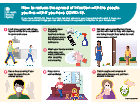
COVID-19: reduce the spread of infection with the people you live with (infographic) English
PDF , 158 KB , 1 page
This file may not be suitable for users of assistive technology.
Infographic text alternative
If you have COVID-19, there is a high risk that others in your household will catch it from you. There are several things you can do to reduce the spread of infection in your household.
Limit close contact with others. Spend as little time as possible in communal areas.
Regularly clean frequently touched surfaces and shared rooms like kitchens and bathrooms.
Wash your hands regularly using soap and water, particularly after coughing and sneezing.
Get help where possible from those you live with. Ask for help with cleaning and being brought food safely to avoid unnecessary contact.
Use a face covering if you need to spend time in shared spaces.
Keep rooms well ventilated.
Catch coughs and sneezes in disposable tissues and put them straight in the bin.
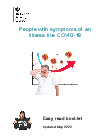
People with symptoms of a respiratory infection including COVID-19 (easy read)
PDF , 1.75 MB , 12 pages
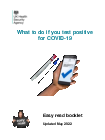
What to do if you test positive for COVID-19 (easy read)
PDF , 627 KB , 7 pages
Translations
People with symptoms of a respiratory infection including COVID-19 (Arabic) ( PDF , 149 KB , 11 pages )
People with symptoms of a respiratory infection including COVID-19 (Bengali) ( PDF , 169 KB , 14 pages )
People with symptoms of a respiratory infection including COVID-19 (Chinese Simplified) ( PDF , 214 KB , 9 pages )
People with symptoms of a respiratory infection including COVID-19 (Chinese Traditional) ( PDF , 252 KB , 9 pages )
People with symptoms of a respiratory infection including COVID-19 (Farsi) ( PDF , 149 KB , 11 pages )
People with symptoms of a respiratory infection including COVID-19 (French) ( PDF , 108 KB , 13 pages )
People with symptoms of a respiratory infection including COVID-19 (Gujarati) ( PDF , 209 KB , 12 pages )
People with symptoms of a respiratory infection including COVID-19 (Hindi) ( PDF , 214 KB , 12 pages )
People with symptoms of a respiratory infection including COVID-19 (Pashto) ( PDF , 150 KB , 12 pages )
People with symptoms of a respiratory infection including COVID-19 (Polish) ( PDF , 173 KB , 12 pages )
People with symptoms of a respiratory infection including COVID-19 (Portuguese) ( PDF , 104 KB , 12 pages )
People with symptoms of a respiratory infection including COVID-19 (Punjabi Gurmukhi) ( PDF , 227 KB , 12 pages )
People with symptoms of a respiratory infection including COVID-19 (Punjabi Shahmukhi) ( PDF , 172 KB , 12 pages )
People with symptoms of a respiratory infection including COVID-19 (Russian) ( PDF , 187 KB , 14 pages )
People with symptoms of a respiratory infection including COVID-19 (Slovak) ( PDF , 169 KB , 11 pages )
People with symptoms of a respiratory infection including COVID-19 (Somali) ( PDF , 104 KB , 13 pages )
People with symptoms of a respiratory infection including COVID-19 (Tamil) ( PDF , 236 KB , 18 pages )
People with symptoms of a respiratory infection including COVID-19 (Ukrainian) ( PDF , 152 KB , 13 pages )
People with symptoms of a respiratory infection including COVID-19 (Urdu) ( PDF , 153 KB , 12 pages )
Reduce the spread of infection with the people you live with (infographic)
COVID-19: reduce the spread of infection with the people you live with (infographic) Arabic ( PDF , 438 KB , 1 page )
COVID-19: reduce the spread of infection with the people you live with (infographic) Bengali ( PDF , 429 KB , 1 page )
COVID-19: reduce the spread of infection with the people you live with (infographic) Chinese simplified ( PDF , 421 KB , 1 page )
COVID-19: reduce the spread of infection with the people you live with (infographic) Chinese traditional ( PDF , 426 KB , 1 page )
COVID-19: reduce the spread of infection with the people you live with (infographic) Farsi ( PDF , 458 KB , 1 page )
COVID-19: reduce the spread of infection with the people you live with (infographic) French ( PDF , 392 KB , 1 page )
COVID-19: reduce the spread of infection with the people you live with (infographic) Gujarati ( PDF , 417 KB , 1 page )
COVID-19: reduce the spread of infection with the people you live with (infographic) Hindi ( PDF , 427 KB , 1 page )
COVID-19: reduce the spread of infection with the people you live with (infographic) Russian ( PDF , 352 KB , 1 page )
COVID-19: reduce the spread of infection with the people you live with (infographic) Pashto ( PDF , 458 KB , 1 page )
COVID-19: reduce the spread of infection with the people you live with (infographic) Polish ( PDF , 392 KB , 1 page )
COVID-19: reduce the spread of infection with the people you live with (infographic) Portuguese ( PDF , 390 KB , 1 page )
COVID-19: reduce the spread of infection with the people you live with (infographic) Punjabi Gurmukhi ( PDF , 415 KB , 1 page )
COVID-19: reduce the spread of infection with the people you live with (infographic) Punjabi Shahmuki ( PDF , 442 KB , 1 page )
COVID-19: reduce the spread of infection with the people you live with (infographic) Slovak ( PDF , 391 KB , 1 page )
COVID-19: reduce the spread of infection with the people you live with (infographic) Tamil ( PDF , 430 KB , 1 page )
COVID-19: reduce the spread of infection with the people you live with (infographic) Ukrainian ( PDF , 352 KB , 1 page )
COVID-19: reduce the spread of infection with the people you live with (infographic) Urdu ( PDF , 461 KB , 1 page )
Added easy read on testing positive for COVID-19.
Added easy read.
Added Russian and Ukrainian translations.
Added translated versions of the infographic.
Added translations.
First published.
Related content
Is this page useful.
- Yes this page is useful
- No this page is not useful
Help us improve GOV.UK
Don’t include personal or financial information like your National Insurance number or credit card details.
To help us improve GOV.UK, we’d like to know more about your visit today. Please fill in this survey (opens in a new tab) .

IMAGES
COMMENTS
How to write a cover letter for aged care jobs. Below, you can find steps to help you write an effective aged care cover letter: 1. Write a cover letter heading. The first step in creating your cover letter can be to include the letter heading. The heading essentially provides the hiring manager with information about your contact details.
A cover letter for aged care workers should be formatted properly, and there's a pattern to follow. You can't go wrong with the following: Fit your cover letter onto one page, aim at 3-4 paragraphs. Choose a cover letter font that is clean and looks professional (Helvetica, Arial, etc.), set it to 12 pts.
Download a cover letter. Keen to apply for a Aged Care Registered Nurse job but not sure what to write in your cover letter? Our free cover letter template includes a complete outline you can customise with your personal information, skills and experience. It even has examples of what to include, making it easier to write a cover letter that ...
Geriatric Nurse Cover Letter Example. Writing a cover letter for a geriatric nursing role is a great opportunity to showcase your professional experience, strengths, and qualifications. Your cover letter should provide a brief but effective snapshot of your suitability for the role, and motivate the reader to learn more about you and your skills.
I am a very caring person with lots of patience and a real concern for the elderly. I am also mentally prepared to handle the emotional aspect of working with the elderly on a daily basis. Please call (555)-555-5555 to arrange an interview. Respectfully, Your Signature. Carol White. Enclosure: Resume.
Download a cover letter. Keen to apply for a Aged Care Worker job but not sure what to write in your cover letter? Our free cover letter template includes a complete outline you can customise with your personal information, skills and experience. It even has examples of what to include, making it easier to write a cover letter that's ...
555-555-5555. [email protected]. St Matthew Hospital. Toronto, ON, United States. 28/12/2019. Application for the position of Geriatric Nurse. Dear Recruiter, I am writing to express my interest in the Geriatric Nurse position at St. Matthew Hospital in Toronto, ON. With over four years of experience in the industry, I have developed a ...
When writing an aged care job cover letter, these are some of the important things to include in your letter: Address the employer with a formal salutation. For example, "Dear/Hello (name of the recipient).". If you do not know the recipient's name, you can refer to them as the hiring manager. The next step is to state the position you ...
Keen to apply for a Registered Nurse job but not sure what to write in your cover letter? Our free cover letter template includes a complete outline you can customise with your personal information, skills and experience. It even has examples of what to include, making it easier to write a cover letter that's professional and relevant ...
Nursing Cover Letter Examples and Templates. With the right care and effort, you can craft a professional nursing cover letter that helps distinguish you from other candidates. We've provided two sample nurse cover letters and a template to help give you an idea of what to write. DOWNLOAD Sample cover letter 1.
Crafting a compelling aged care cover letter is a critical step in the job application process and can be the difference between getting an interview and being overlooked for an aged care job.. Accompanied by your resume, a well-written cover letter not only showcases your qualifications and experiences but also reflects your passion and commitment to caring for the elderly.
Formatting : Leave your name out of your address if using a block format. Date: Every letter needs a date, even a cover letter. Include the date near the top, and make sure it reflects the day you submit, not the day you started writing. Formatting : Write the full date, e.g., January 5, 2023.
Benefits of Writing a Nursing Cover Letter. Most candidates don't take the time to create a cover letter. In the world of online applications, attaching one is usually optional and feels like extra work. So many applicants fill out the bare minimum and move on to the next job posting. Stand out from the competition - Write a killer cover letter.
2. Write the date and company name and greet the hiring manager. Under your contact details, you can write the date you're writing your cover letter. The hiring manager may reference this date to confirm you've applied for the role before the application deadline. On the next line, you can write the name of the organisation hiring a registered ...
The following resume and cover letter guide will help you prepare your application. Your Resume. Your resume should be a succinct, professional document which outlines your skills, qualifications and experience. Nicole Wren, of Resumes to Impress, suggests you aim for 2-3 pages in length. It should include the following sections (usually in ...
Sample Cover Letter for Aged Care Resume With No Experience. Sarah Thompson. 66 S 100 W. Rupert, ID 66482. (000) 222-5241. sarah@email. November 26, 2021. Mr. Collin Hopegood. Manager HR.
Registered Nurse Advice. Our registered nurse cover letter examples have been designed to help you create or improve your own cover letter. Becoming a registered nurse requires extensive training a background in patient care, and clinical instruction. It also requires a solid cover letter, highlighting your RN background.
Sample Cover Letter for Aged Care Worker Position. May 24, 2022. Dear Mr. Parker: Your job advertisement on indeed.com depicts that you are looking for an energetic person to fill your aged care worker position. I deem myself an excellent candidate for this position because I possess relevant experience, compassion, and a calm temperament to ...
Sincerely, [Your name] Sample cover letter for aged care. Hello! I am writing to apply for the open position of caretaker at your nursing home. I have years of experience providing care for seniors, and I feel confident that I would be a great fit for this role. I am patient, compassionate, and reliable, and I have a strong commitment to ...
Related: Working in Aged Care: Jobs, Duties, Salaries and FAQs How to write an aged care nurse resume Consider following these steps when drafting your resume to improve your chances of a successful application: 1. Give your resume a structure Establishing a logical structure for your resume is a simple way to help improve its effectiveness.
1. Download one of our free resume templates. 2. Tailor your resume with your skills, experience and contact details. 3. Review your resume before saving it as a PDF. Then you're ready to start applying with it! Download modern template. Download professional template.
April 26, 2021. Download your free cover letter template for your next Aged Care job! Finish up in less than 10 minutes! DOWNLOAD. Qualy_Cover-Letter_Aged-Care Download. Written By. farouk-peak.
555-555-5555. [email protected]. Martia Care, Inc. Liverpool, United Kingdom. 08/10/2019. Application for the position of Home Care Nurse. Dear Hiring Manager, I am writing to express my strong interest in the Home Care Nurse position at your institution. I was impressed by the job posting and believe that my patient-oriented approach, along ...
[email protected]. Professional Summary. Dedicated and compassionate registered nurse with 12 years of experience working with HIV/AIDS patients. Proven ability to provide direct patient care in a fast-paced environment. Calm and level-headed with the ability to handle difficult patients and high-stress situations.
You can use this tool to find and compare different types of Medicare providers (like physicians, hospitals, nursing homes, and others). Use our maps and filters to help you identify providers that are right for you. Find Medicare-approved providers near you & compare care quality for nursing homes, doctors, hospitals, hospice centers, more.
sore throat, stuffy or runny nose. diarrhoea, feeling sick or being sick. If you are feeling unwell with these symptoms you should get plenty of rest and drink water to keep hydrated. You can use ...